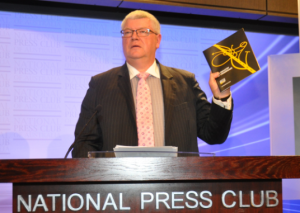The Victorian Automotive Chamber of Commerce (VACC) has expressed its support for the call made by the Australian Motor Industry Federation (AMIF) which urges the Federal and State governments to rethink the nation’s automotive industry policy.

Image Credit: VACC media release
“VACC wholeheartedly supports AMIF’s Federal Election position,” says VACC Executive Director David Purchase in a media release. “Given the repair, service and retail sector’s contribution to the local community and the national economy, it is irresponsible to consider the industry without it. Any long term policy on the automotive industry has to include the whole industry.”
This follows after AMIF CEO Richard Dudley said the industry was facing a ‘perfect storm’, where every sector of the automobile industry is undergoing generational change.
On Tuesday the AMIF Chief addressed the National Press Club in Canberra and said there is too much emphasis placed on car makers and not enough focus being given to the repair, service and retail sector.
‘There must be a different approach to policy planning for the future. For too long, successive Governments have failed to recognise that the domestic automotive industry does not begin and end with vehicle and component manufacturing. This is why we continue to see ineffective, ad-hoc policy that fails to address the critical issues all of the automotive industry is facing,” said Mr. Dudley, quoted in a media release on the AMIF website.
Dudley cited industry data to support the AMIF plan. According to him 2,700 workers left the car and components manufacturing sector during the 2011/12 period, but over 13,000 people left the automotive service and repair sector during the same time.
He also mentioned recent research showing a shortage of 19,000 skilled mechanics in Australia. When these shortages are combined with other factors such as the effects of globalization, environmental protection policy, technological advances and changing consumer behavior, Dudley says they will create a “maelstrom that will have catastrophic consequences on the entire industry.”
“Given that the automotive retail, service, repair and recycling sectors make up the largest concentration of small business in Australia, and depth of Australia’s reliance on the motor vehicle, it is irresponsible to consider any policy mechanism outside of a White Paper/Green Paper to develop comprehensive, evidence based policy to guide and sustain the medium and long term future of the Australian automotive industry,” said Mr. Dudley.














